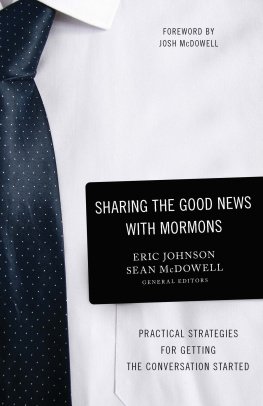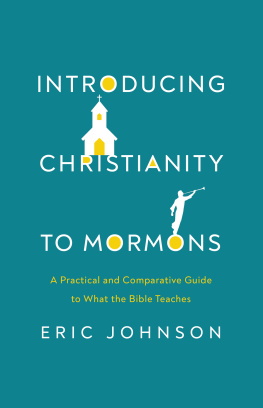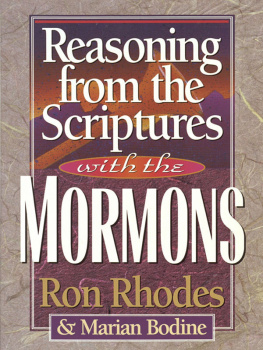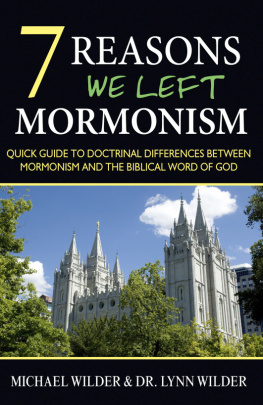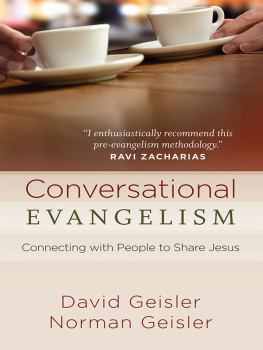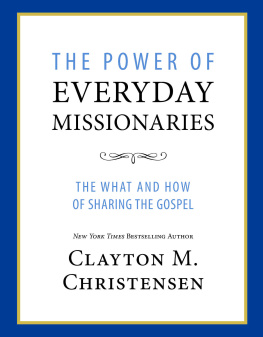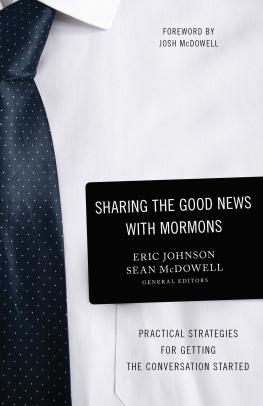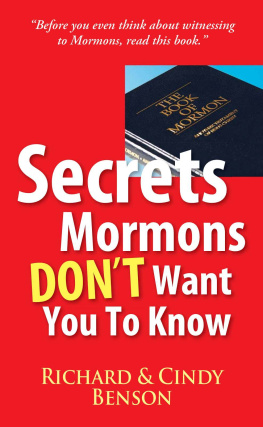T his book would not be the same without the editing skills of Erics oldest child, Carissa, and Mormonism Research Ministry associate Sharon Lindbloom. Both of you have made this book better and we are deeply indebted to you. Also, we want to thank those contributors who have provided a diversity of evangelistic methods described in this book and made this project possible. We believe your ideas will encourage many who will use these approaches in the upcoming years. May our Lord provide you with His richest blessing on your ministries. Finally, a book of evangelism aimed at a specific people group (Mormons) is a tough sell for most publishers, but our hats go off to Terry Glaspey and the team at Harvest House Publishers. You believed in this project from the very beginning and have been supportive each step of the way. Thank you for your ministry mindset and a sincere desire to see Mormons find their way to Jesus.
T here has only ever been, and ever will be one eternal God (Isaiah 43:10). He is perfect, unchangeable, and without limitation (Malachi 3:6). He has revealed Himself to us through His Word, the Bible. He created everything that exists (Genesis 1:1): every universe, every cell (Psalm 147:4); every star, to every blade of grass, every atom that has ever existedand every personincluding you and me (John 1:3). And he gave us a code to live by and placed it in our hearts as a conscience to know right from wrong (Romans 2:15).
But you and I, on many occasions, have chosen wrong (Isaiah 53:6). The Bible tells us, All have sinned and fall short of the glory of God (Romans 3:23). That no one is righteous, no, not one (Romans 3:10).
Because of this rebellion against our Creator, we have caused a separation between us and God (Isaiah 59:2). And it is a gap so wide that we can never cross it by our efforts (Ephesians 2:12). But many have tried. In realizing their sin, some people have tried to do good things to outweigh the bad. But God has declared that even all of our righteous deeds are like filthy rags to Him (Isaiah 64:6).
Others have thought that if they could just stop doing bad things, they would be good enough. But the Bible says that if weve done even one thing wrong, we are lawbreakers, and subject to the full penalty of the law (James 2:10).
This penalty is death (Romans 6:23). Eternal separation from God. Because God is perfect and we are notHe is just in His judgment, and you and I stand guilty before a Righteous Judge (Romans 2:2).
But God loved us so much that He sent His one and only Son, Jesus, to come to earth (John 3:16), to enter into our mess, and live the perfect life we should have lived (Hebrews 4:15), and in regard to our standing before God, He traded places with us (2 Corinthians 5:21). He was blameless but He took our punishment of death. We stand guilty, but we can have His reward of eternal life (Romans 3:24-25).
God demonstrated His love for us in this, that while we were still sinners Christ died for us (Romans 5:8).
Jesus died the death that we should have died, but He didnt stay in the grave (Acts 2:24). He rose from the dead defeating sin and death, and sharing His victory with all who will believe in Him (1 Corinthians 15:57). Now we can be seen as innocent in the eyes of God (Isaiah 43:25)!
A man once asked Jesus, What must we do to be doing the works of God? Jesus answered him, This is the work of God, that you believe in him whom he has sent (John 6:28-29).
And that is the gospel: that anyone who will repent of sin and turn not to good works, religious systems, or traditions of men, but to belief in the one and only Son of God, Jesus Christ, will be saved (Acts 3:19; 16:31).
The Bible says that it is by grace that we have been saved through faith and not by our works (Ephesians 2:8). That it is not possible for us to earn Gods forgiveness through any deeds that we can do (Romans 11:6). God says that anyone who relies on his own works is under a curse (Galatians 3:10), because no one can be justified by his accomplishments (Romans 3:20).
This gospel is so important to God that He warns us if anyone tries to add anything to, or take anything from this message, even if that messenger is an angel from heaven, he will be eternally condemned (Galatians 1:8). God has guarded His true gospel throughout the ages (Matthew 16:18), and through His servants, He shares it freely to all who will hear it (Romans 10:14-17).
Today God has freely offered you His gift of grace and salvation. And that is good news!
I ts impossible to communicate with your Latter-day Saint friend unless you have an understanding of the definition of vocabulary terms. Some words used in Mormonism are also used in Christianity, although these typically have different meanings. Meanwhile, many LDS terms are unique to Mormonism. This is the purpose of Appendix 2; we will define the words as typically understood by the Mormon community. Feel free to use this resource throughout your reading of the book.
We will use italics with words used in a particular definition that are defined in this section. Words in parentheses that follow a particular term are synonymous with the term being defined.
Aaronic Priesthood: The authority to perform certain ecclesiastical tasks, allegedly bestowed by John the Baptist onto Joseph Smith and his friend Oliver Cowdery on May 15, 1829. Baptized Mormon males 12 years and older are eligible to receive this priesthood .
Agency: The ability to choose right from wrong, referring to both people on the earth today as well as all spirits in the preexistence .
Anti-Mormon: Usually a pejorative term used to refer to those (typically Christians) who are critical of Mormonism and therefore are considered hateful by many Mormons. It can also refer to any information from any source that places the LDS Church in a bad light.
Apostasy, Great: The belief that true Christianity lost its authority after the death of Christs apostles, which made it necessary for God to restore the true church through Joseph Smith and the founding of the LDS Church in 1830.
Apostle: One of 12 members in the second-highest governing body of the LDS Church and considered to be a General Authority . The most senior member is the President of the Quorum of the Twelve Apostles, who is next in line to become the churchs president .
Atonement: A work accomplished through the suffering of Jesus at Gethsemane and His death on the cross that allows all humans to rise in the resurrection to one of three kingdoms of glory . The Mormon atonement also paves the way for potential exaltation in the celestial kingdom.
Baptism: Required for the remission of sins and membership in the LDS Church. Baptismal candidates must be eight years or older. A Mormon male who holds Melchizedek priesthood authority immerses the candidate in water, usually at a local LDS chapel . A covenant with God is made at this time, with the candidate promising to keep all the commandments .
Baptism for the Dead: Also known as baptism by proxy or vicarious baptism, this ordinance is performed in Mormon temples by living church members on behalf of someone who is deceased. The soul for whom the work is done is given a chance to receive the gospel in spirit prison.
Bible: One of the four Standard Works . The official translation used is the King James Version of the Bible. According to the Eighth Article of Faith, the Bible is true only as far as it is translated correctly.
Bishop: An unpaid leader of a local Mormon ward whose duties are similar to the responsibilities of a Christian pastor.
Book of Mormon: One of the four Standard Works . Contains the alleged story of an ancient Jewish civilization that existed on the American continent. It was originally compiled on gold plates that were buried in a hill in New York and translated by LDS Church founder Joseph Smith . Missionaries often use Moroni 10:4, found at the end of the scripture, to challenge prospective converts to receive the confirmation of this books truthfulness.
Next page
